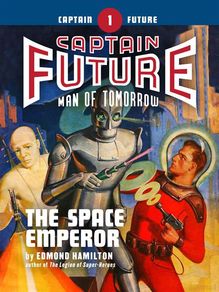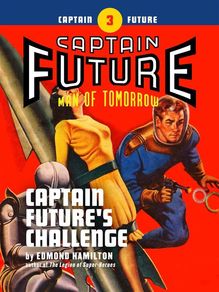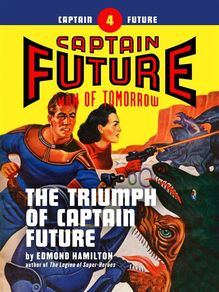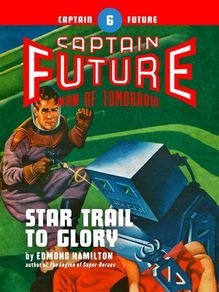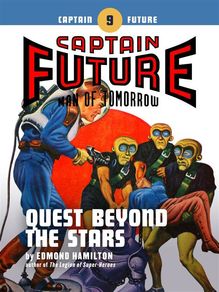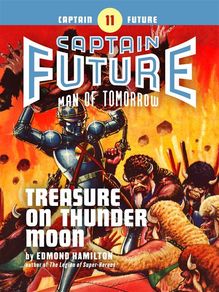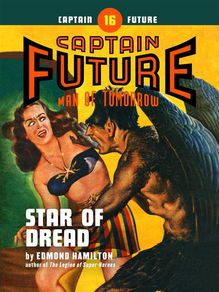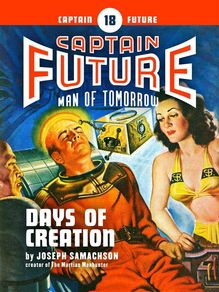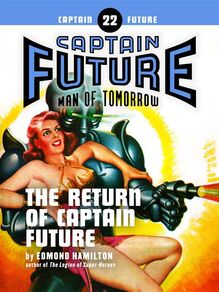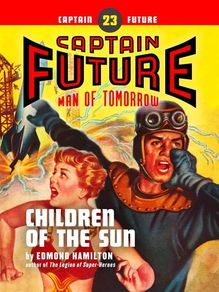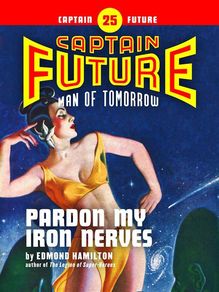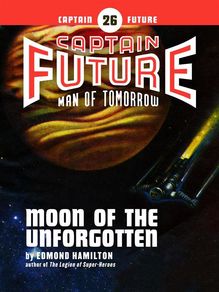-
 Univers
Univers
-
 Ebooks
Ebooks
-
 Livres audio
Livres audio
-
 Presse
Presse
-
 Podcasts
Podcasts
-
 BD
BD
-
 Documents
Documents
-
- Cours
- Révisions
- Ressources pédagogiques
- Sciences de l’éducation
- Manuels scolaires
- Langues
- Travaux de classe
- Annales de BEP
- Etudes supérieures
- Maternelle et primaire
- Fiches de lecture
- Orientation scolaire
- Méthodologie
- Corrigés de devoir
- Annales d’examens et concours
- Annales du bac
- Annales du brevet
- Rapports de stage
La lecture à portée de main
Vous pourrez modifier la taille du texte de cet ouvrage
Découvre YouScribe en t'inscrivant gratuitement
Je m'inscrisDécouvre YouScribe en t'inscrivant gratuitement
Je m'inscrisEn savoir plus
Vous pourrez modifier la taille du texte de cet ouvrage
En savoir plus

Description
The Captain Future saga follows the super-science pulp hero Curt Newton, along with his companions, The Futuremen: Grag the giant robot, Otho the android, and Simon Wright the living brain in a box. Together, they travel the solar system in series of classic pulp adventures, many of which written by the author of The Legion of Super-Heroes, Edmond Hamilton.
Sujets
Informations
| Publié par | Thrilling |
| Date de parution | 29 novembre 2018 |
| Nombre de lectures | 0 |
| EAN13 | 9788829562367 |
| Langue | English |
Informations légales : prix de location à la page 0,0005€. Cette information est donnée uniquement à titre indicatif conformément à la législation en vigueur.
Extrait
Earthmen No More
Captain Future book #27
by
Edmond Hamilton
When the Futuremen revived John Carey from his deep freeze, he wanted to go home—but where in space was home?
Thrilling
Copyright Information
“Earthmen No More” was originally published in 1951. No part of this book may be reproduced or utilized in any form or by any means, electronic or mechanical, without permission in writing from the publisher.
Chapter I
The Awakening
STILL and cold in its lightless vault of bone, the brain stirred feebly. Slowly, slowly, it began to wake and remember—timeless memories, flowing across it in a dark inchoate tide from nowhere into nothingness.
He was alone in space. Quite alone, floating, turning, drifting. He had no destination and he was in no hurry. He had lost the Sun and the planets. There were not even any stars.
He did not worry. The dead do not insist on stars. He had forgotten how he came to die and he was glad.
After a long while, far distant in the infinite night, he saw a tiny gleam. He regarded it without curiosity or fear and then he realized that some inexorable current had caught him and was sweeping him toward the light, hurling him at it in a swift relentless rush. He knew that he did not want to go to it—but there was no escape.
The little point of light leaped and spread into a sun, a nova, a shattering glare. Terror overcame him. He clawed at the comforting darkness as it fled past but he could not hold onto it and it seemed to him that he could hear the small thin shrieking of his body against the void as it was sucked into the devouring brilliance.
There was a face between him and the light, huge and awesome. He cried out but no sound came and then it was gone, the light, the face, even himself, swallowed up in the quiet night.
Memories—the aloneness, the remembering, the timeless drift. A sound like the rustle of far-off surf that boomed louder and louder and became a voice speaking out of the heavens, saying, “Wake up, John Carey! Wake up!”
And he thought he answered, “But I am dead.”
How had he come to die?
MEMORIES, groping, uncertain, coming faster, clearer, clothed in vivid color. A girl’s face, a girl’s red mouth saying, “Don’t go. Don’t go if you love me. You’ll never come back.”
Men and a ship—a little ship, a frail and tiny craft, it seemed, for the long way it was going and the high dreams it had. Hard-faced iron-handed men, braver than angels and more hungry than they were brave, hungry for new worlds and the unknown things that lay beyond the mountains of the Moon, beyond the still canals of Mars, beyond the glittering deadly Belt.
He remembered now the men and the ship, how they had gambled their lives against glory and lost. “We shot the Asteroids,” he muttered, in the silence of his mind. “Jupiter was there ahead of us, a big golden apple almost in our hands. I remember how the moons looked, swarming like bees around it. I remember….”
The meteor—the tearing agony of metal, the last glimpse of horror in the ship before the air-burst took him with it into space, through the riven pilot-dome. The brief, bitter knowledge that this was death.
“Dead,” he said again. “I’m dead.”
The strange voice answered, “If you want to you can live again.”
He thought about that. He thought about it for a long time in the darkness. To live again—the light and the warmth, the hunger and pain and hope, the wanting, the being able to want. He thought and he was not sure and then at last he whispered, “How? Tell me how!”
“Open your eyes and come back, back where the light is. You were here before, don’t you remember? Open your eyes, John Carey!”
He did or thought he did and there was nothing but mist, heavy darkling clouds of it. Far, far away he saw the gleam of light beyond him and he tried to grope toward it but the mists were very thick.
“I can’t,” he moaned. “I’m lost.”
Lost forever, in darkness and cold. “Come back!” cried the voice strongly. “Come back and live!”
He heard the sound of a hand striking smartly against flesh. After a while he felt it. That little sharp pain somehow managed to bridge a colossal gulf and make him aware that he had a body.
His brain oriented itself with a dizzying lunge. The mists tore away. He woke.
It was a full awakening. The exploding nova resolved itself into a light-tube, glowing against a low ceiling of metal. The countenance that had loomed so hugely above him became the face of a man. A lean face, deeply bronzed with the unmistakable burn of space, topped with red hair and set with two level grey eyes that looked straight into Carey’s and made him feel somehow safe and unafraid.
“Lie still,” said the red-haired man. “Get your breath. There’s no hurry.” He turned aside and his hands, very strong but delicate of touch, busied themselves with a vial and a gleaming needle.
Carey lay still. For the moment he had not the strength to do anything else. The room was small. It was fitted as a laboratory, incredibly compact, and many of the objects that his wandering gaze passed over were strange to him.
One of these objects was a small cubical case of semi-translucent metal, resting on a table. The surface nearest Carey was fitted with twin lenses and a disc, so that it bore an unsettling resemblance to a face. Carey thought vaguely that it must be some sort of a communicator.
Suddenly he said, “I’m in a ship.”
The red-haired man smiled. “How can you tell? We’re in free fall.”
“I can tell.” Carey tried to struggle up. “But there are no ships beyond the Belt! How….” Then he began to tremble violently. “Listen,” he said to the stranger. “Listen, I was killed, trying to reach Jupiter. A meteor hit us and I was blown clear, out into space with no armor. I’m dead. I’m a dead man. I….”
“Steady on,” said the red-haired man. “Easy.” He set the needle into a place already swabbed on Carey’s naked arm. Carey flinched. He sobbed a little and then the trembling quieted.
“I was dead,” he whispered, again.
“No,” said the red-haired stranger. “Not really dead. What we call the space-death isn’t true death but cold shock—an instantaneous stoppage of all life processes. There’s no time for deterioration or cellular damage, no possibility of decay. The organism stops short. It can, by certain means, be started going again.”
He looked thoughtfully down at Carey and added, “Many lives are restored that way, lives that would have been considered ended in your time.”
Carey said numbly, “Then you found me, floating in space, in frozen sleep? You—revived me?”
“Yes. Space law requires that any ship-wreckage encountered on radar must be investigated. That’s how we found you.” The stranger smiled. “Welcome back to life, Carey. My name is Curt Newton.”
It was only then that it penetrated Carey’s stunned mind, the phrase that had been used so casually a moment before.
“You said, ‘In my time’,” he repeated. “How long….” He stopped. His mouth was dry. He tried again, forcing out the words that did not wish to be spoken. “How long was I asleep out there?”
The man who called himself Curt Newton hesitated, then asked, “What year was it when you met disaster, Carey?”
“It was nineteen ninety-one. It was June, nineteen ninety-one, when we left Earth.”
Newton reached for a calendar pad, held it up. He did not speak and there was pity in his eyes.
Carey saw the date on it, and at first it was too incredible to touch him. “Oh, no,” he said. “Not all that time, all those generations. No, it’s not true.”
“It is.”
“But it can’t be….” His voice trailed off. The numbers on the pad, the awful sum of years blurred and darkened before him. Once more he began to tremble and this time it was for fear of life, not of death. “Why did you bring me back?” he whispered. “I have no place here. I’m still a dead man.”
ABRUPTLY, from beyond the closed bulkhead door, there came the sound of footsteps. Strange steps, ponderous and clanking, as though someone enormously heavy walked in metal boots. Curt Newton turned his head sharply.
“Grag!” he called. “Hold on there. Wait!”
The footsteps hesitated and a voice from beyond the door said mockingly, “I told you so. What do you want to do, frighten the poor chap out of his wits?
-
 Univers
Univers
-
 Ebooks
Ebooks
-
 Livres audio
Livres audio
-
 Presse
Presse
-
 Podcasts
Podcasts
-
 BD
BD
-
 Documents
Documents
-
Jeunesse
-
Littérature
-
Ressources professionnelles
-
Santé et bien-être
-
Savoirs
-
Education
-
Loisirs et hobbies
-
Art, musique et cinéma
-
Actualité et débat de société
-
Jeunesse
-
Littérature
-
Ressources professionnelles
-
Santé et bien-être
-
Savoirs
-
Education
-
Loisirs et hobbies
-
Art, musique et cinéma
-
Actualité et débat de société
-
Actualités
-
Lifestyle
-
Presse jeunesse
-
Presse professionnelle
-
Pratique
-
Presse sportive
-
Presse internationale
-
Culture & Médias
-
Action et Aventures
-
Science-fiction et Fantasy
-
Société
-
Jeunesse
-
Littérature
-
Ressources professionnelles
-
Santé et bien-être
-
Savoirs
-
Education
-
Loisirs et hobbies
-
Art, musique et cinéma
-
Actualité et débat de société
- Cours
- Révisions
- Ressources pédagogiques
- Sciences de l’éducation
- Manuels scolaires
- Langues
- Travaux de classe
- Annales de BEP
- Etudes supérieures
- Maternelle et primaire
- Fiches de lecture
- Orientation scolaire
- Méthodologie
- Corrigés de devoir
- Annales d’examens et concours
- Annales du bac
- Annales du brevet
- Rapports de stage
